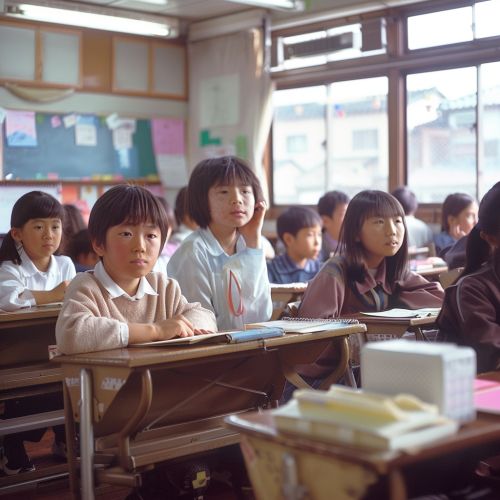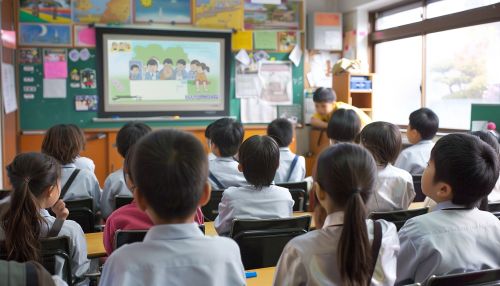Education in Tokyo
Overview
Education in Tokyo is a multifaceted system that encompasses a wide array of institutions, policies, and practices. As the capital of Japan, Tokyo's educational landscape is characterized by its diversity, high standards, and innovative approaches. This article delves into the various aspects of education in Tokyo, including its historical development, structure, policies, challenges, and future directions.
Historical Development
The history of education in Tokyo is deeply intertwined with the broader history of education in Japan. The Meiji Restoration in 1868 marked a significant turning point, as the government sought to modernize the country by adopting Western educational models. The establishment of Tokyo University (now the University of Tokyo) in 1877 was a landmark event, symbolizing the city's commitment to higher education and research.
During the Taisho and Showa periods, Tokyo saw the expansion of both public and private educational institutions. The post-World War II era brought about significant reforms, including the introduction of the 6-3-3-4 system (six years of elementary school, three years of junior high school, three years of high school, and four years of university). These reforms aimed to democratize education and make it accessible to all citizens.
Structure of the Educational System
Primary and Secondary Education
Tokyo's primary and secondary education system follows the national 6-3-3-4 structure. Elementary education (shōgakkō) lasts for six years and is compulsory for children aged 6 to 12. Junior high school (chūgakkō) follows for three years, catering to students aged 12 to 15. High school (kōtōgakkō) is not compulsory but is attended by the majority of students for three years, from ages 15 to 18.
The curriculum is standardized across the nation, with a strong emphasis on subjects such as mathematics, science, Japanese language, social studies, and physical education. English language education has also become increasingly important, starting from the fifth grade in elementary school.


Higher Education
Tokyo is home to some of Japan's most prestigious universities, including the University of Tokyo, Waseda University, and Keio University. Higher education institutions in Tokyo offer a wide range of undergraduate and graduate programs, as well as specialized research opportunities.
The University of Tokyo, established in 1877, is renowned for its research output and academic excellence. It consistently ranks among the top universities in Asia and the world. Waseda University, founded in 1882, is known for its liberal arts education and strong emphasis on internationalization. Keio University, established in 1858, is Japan's oldest private university and is recognized for its contributions to business and technology.
Vocational Education
Vocational education in Tokyo is provided by specialized training colleges (senmon gakkō) and technical colleges (kōsen). These institutions offer practical training in fields such as engineering, healthcare, information technology, and the arts. Vocational education is designed to equip students with the skills needed to enter the workforce directly after graduation.
Educational Policies and Reforms
Tokyo's educational policies are influenced by both national directives and local initiatives. The Ministry of Education, Culture, Sports, Science and Technology (MEXT) sets the overall framework, while the Tokyo Metropolitan Board of Education oversees the implementation of policies within the city.
Recent reforms have focused on enhancing the quality of education, promoting internationalization, and addressing issues such as bullying and mental health. The introduction of the "Super Global High School" program aims to foster global competencies among high school students by providing opportunities for international exchange and collaboration.
Challenges and Issues
Despite its many strengths, the education system in Tokyo faces several challenges. One of the most pressing issues is the intense pressure on students to succeed academically. The highly competitive nature of entrance exams for prestigious high schools and universities can lead to significant stress and anxiety.
Bullying (ijime) is another critical issue that has garnered attention in recent years. Efforts to combat bullying include the implementation of anti-bullying policies, counseling services, and awareness campaigns.
Additionally, there is a growing concern about the declining birth rate and its impact on the education system. Fewer students mean that some schools may face closures or mergers, and there is an ongoing debate about how to adapt to this demographic shift.
Future Directions
The future of education in Tokyo is likely to be shaped by several key trends. One of these is the increasing use of technology in the classroom. The COVID-19 pandemic accelerated the adoption of digital tools for remote learning, and there is a continued interest in integrating technology to enhance educational outcomes.
Another important trend is the emphasis on fostering creativity and critical thinking skills. Traditional rote learning methods are being supplemented with more interactive and student-centered approaches, such as project-based learning and collaborative activities.
Internationalization remains a priority, with efforts to attract more foreign students and promote global exchange programs. Tokyo's universities are expanding their English-taught programs and establishing partnerships with institutions around the world.
See Also
- University of Tokyo
- Japanese Education System
- Vocational Education in Japan
- Bullying in Japan
- Internationalization of Education
